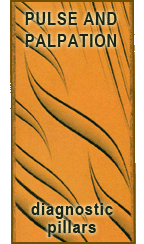Archive for the ‘Pulse-Palpation’ Category
Simple Pulse Qualities: Width

Width: thin-wide A thin pulse suggests a lack of substance in the vessels.
 Last modified: August 18, 2009 ·
Last modified: August 18, 2009 ·  al ·
al ·  No Comments
No Comments
 Tags: Diagnosis, Practitioners · Posted in: Pulse Class, Pulse-Palpation
Tags: Diagnosis, Practitioners · Posted in: Pulse Class, Pulse-Palpation
Simple Pulse Qualities: Length

Length: short-long. If the strength of the pulse is the best tie breaking quality to differentiate between excess and deficiency, the length of the pulse is the least likely to help you understand anything.
 Last modified: August 17, 2009 ·
Last modified: August 17, 2009 ·  al ·
al ·  No Comments
No Comments
 Tags: Diagnosis, Palpation · Posted in: Pulse Class, Pulse-Palpation
Tags: Diagnosis, Palpation · Posted in: Pulse Class, Pulse-Palpation
Simple Pulse Qualities: Shape

Shape: slippery-choppy The unique qualities of the slippery and/or choppy pulse are its wave shape.
 Last modified: August 16, 2009 ·
Last modified: August 16, 2009 ·  al ·
al ·  No Comments
No Comments
 Tags: Diagnosis, Palpation · Posted in: Pulse Class, Pulse-Palpation
Tags: Diagnosis, Palpation · Posted in: Pulse Class, Pulse-Palpation
Simple Pulse Qualities: Tension

Tension: slack-taut For those who’ve studied pulse diagnosis already, the “taut” pulse is what we’d call “wiry” or its many other translations such as taut, string-taut, bowstring, etc.
 Last modified: August 15, 2009 ·
Last modified: August 15, 2009 ·  al ·
al ·  No Comments
No Comments
 Tags: Diagnosis, Palpation · Posted in: Pulse Class, Pulse-Palpation
Tags: Diagnosis, Palpation · Posted in: Pulse Class, Pulse-Palpation
The Floating, Superficial Pulse (Fu Mai)

Floating Pulse (浮脈 Fu Mai, superficial) Key point: superficial, Indications: exterior condition: defensive yang mobilizes externally bringing with it the qi and blood, resulting in the floating pulse.
 Last modified: August 14, 2009 ·
Last modified: August 14, 2009 ·  al ·
al ·  No Comments
No Comments
 Tags: Diagnosis, Practitioners · Posted in: Pulse Class, Pulse-Palpation
Tags: Diagnosis, Practitioners · Posted in: Pulse Class, Pulse-Palpation
The Submerged, Deep Pulse (Chen Mai)

Submerged Pulse (沉脈 Chen Mai, deep)Key point: deep. Indications:(Forceful) interior excess condition: excessive pathogenic factors obstruct the outward and upward movement of the qi, blood, and yang.
 Last modified: August 13, 2009 ·
Last modified: August 13, 2009 ·  al ·
al ·  No Comments
No Comments
 Tags: Diagnosis, Practitioners · Posted in: Pulse Class, Pulse-Palpation
Tags: Diagnosis, Practitioners · Posted in: Pulse Class, Pulse-Palpation
The Confined, Firm Pulse (Lao Mai)

Confined Pulse (牢脈 Lao Mai, firm) Key points: deep, forceful, wide, taut, long, stable. Indications:interior excess cold (hernia, lumps, masses): yin cold traps yang qi within, can\’t rise to the surface.
 Last modified: August 12, 2009 ·
Last modified: August 12, 2009 ·  al ·
al ·  No Comments
No Comments
 Tags: Diagnosis, Palpation · Posted in: Pulse Class, Pulse-Palpation
Tags: Diagnosis, Palpation · Posted in: Pulse Class, Pulse-Palpation
The Hidden Pulse (Fu Mai)

Hidden Pulse (伏脈 Fu Mai) key point: very deep. Indications: (forceful) pathogens obstructing the interior: qi and blood cannot flow or lift externally.
 Last modified: August 11, 2009 ·
Last modified: August 11, 2009 ·  al ·
al ·  No Comments
No Comments
 Tags: Diagnosis, Palpation · Posted in: Pulse Class, Pulse-Palpation
Tags: Diagnosis, Palpation · Posted in: Pulse Class, Pulse-Palpation
The Leather, Tympanic, Drum-Skin Pulse (Ge Mai)

Leather Pulse (革脈 Ge Mai, tympanic, drum-skin) Key points: superficial, forceful, taut, wide, and hollow Indications: blood loss, abortion, jing exhaustion: sudden loss of blood or jing causes qi to float with the hollow insides due to sudden lack of blood or jing.
 Last modified: August 10, 2009 ·
Last modified: August 10, 2009 ·  al ·
al ·  No Comments
No Comments
 Tags: Diagnosis, Palpation · Posted in: Pulse Class, Pulse-Palpation
Tags: Diagnosis, Palpation · Posted in: Pulse Class, Pulse-Palpation
The Hollow, Scallion Stalk, Onion Pulse (Kou Mai)

Hollow Pulse (芤脈 Kou Mai, scallion stalk, onion)Key points: floating, wide, slack, with an obscure center.
 Last modified: August 9, 2009 ·
Last modified: August 9, 2009 ·  al ·
al ·  No Comments
No Comments
 Tags: Diagnosis, Palpation · Posted in: Pulse Class, Pulse-Palpation
Tags: Diagnosis, Palpation · Posted in: Pulse Class, Pulse-Palpation
